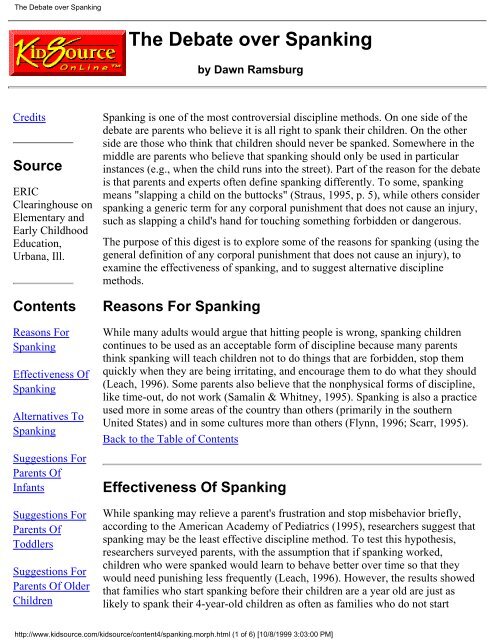spanking - Unauthorized web page
spanking - Unauthorized web page
spanking - Unauthorized web page
Create successful ePaper yourself
Turn your PDF publications into a flip-book with our unique Google optimized e-Paper software.
The Debate over Spanking<br />
Credits<br />
Source<br />
ERIC<br />
Clearinghouse on<br />
Elementary and<br />
Early Childhood<br />
Education,<br />
Urbana, Ill.<br />
Contents<br />
Reasons For<br />
Spanking<br />
Effectiveness Of<br />
Spanking<br />
Alternatives To<br />
Spanking<br />
Suggestions For<br />
Parents Of<br />
Infants<br />
Suggestions For<br />
Parents Of<br />
Toddlers<br />
Suggestions For<br />
Parents Of Older<br />
Children<br />
The Debate over Spanking<br />
by Dawn Ramsburg<br />
Spanking is one of the most controversial discipline methods. On one side of the<br />
debate are parents who believe it is all right to spank their children. On the other<br />
side are those who think that children should never be spanked. Somewhere in the<br />
middle are parents who believe that <strong>spanking</strong> should only be used in particular<br />
instances (e.g., when the child runs into the street). Part of the reason for the debate<br />
is that parents and experts often define <strong>spanking</strong> differently. To some, <strong>spanking</strong><br />
means "slapping a child on the buttocks" (Straus, 1995, p. 5), while others consider<br />
<strong>spanking</strong> a generic term for any corporal punishment that does not cause an injury,<br />
such as slapping a child's hand for touching something forbidden or dangerous.<br />
The purpose of this digest is to explore some of the reasons for <strong>spanking</strong> (using the<br />
general definition of any corporal punishment that does not cause an injury), to<br />
examine the effectiveness of <strong>spanking</strong>, and to suggest alternative discipline<br />
methods.<br />
Reasons For Spanking<br />
While many adults would argue that hitting people is wrong, <strong>spanking</strong> children<br />
continues to be used as an acceptable form of discipline because many parents<br />
think <strong>spanking</strong> will teach children not to do things that are forbidden, stop them<br />
quickly when they are being irritating, and encourage them to do what they should<br />
(Leach, 1996). Some parents also believe that the nonphysical forms of discipline,<br />
like time-out, do not work (Samalin & Whitney, 1995). Spanking is also a practice<br />
used more in some areas of the country than others (primarily in the southern<br />
United States) and in some cultures more than others (Flynn, 1996; Scarr, 1995).<br />
Back to the Table of Contents<br />
Effectiveness Of Spanking<br />
While <strong>spanking</strong> may relieve a parent's frustration and stop misbehavior briefly,<br />
according to the American Academy of Pediatrics (1995), researchers suggest that<br />
<strong>spanking</strong> may be the least effective discipline method. To test this hypothesis,<br />
researchers surveyed parents, with the assumption that if <strong>spanking</strong> worked,<br />
children who were spanked would learn to behave better over time so that they<br />
would need punishing less frequently (Leach, 1996). However, the results showed<br />
that families who start <strong>spanking</strong> before their children are a year old are just as<br />
likely to spank their 4-year-old children as often as families who do not start<br />
http://www.kidsource.com/kidsource/content4/<strong>spanking</strong>.morph.html (1 of 6) [10/8/1999 3:03:00 PM]






